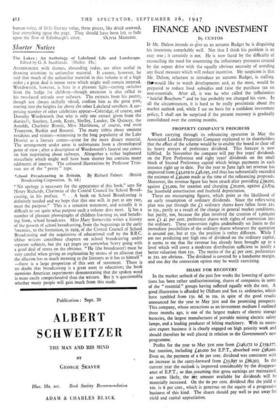school Broadcasting in Britain. By Richard Palmer. (British Broadcasting Corporation.
3s. 6d.) " No apology is necessary for the appearance of this book," says Sir Henry Richards, Chairman of the Central Council for School Broad- casting, in his preface. ". . . A book on School Broadcasting is definitely needed and we hope that this one will, in part at any rate, meet the purpose." This is a tentative statement, and actually it is difficult to see quite what purpose such a volume does meet. It has a number of pleasant photographs of children listening to, and benefit- ing from, school broadcasts. Miss Mary Somerville writes a history of the growth of school broadcasting, from the beginnings in the early 'twenties, to the formation, in 1929, of the Central Council of School Broadcasting and the acquisition of educational staff by the B.B.C. Other writers contribute chapters on school broadcasting under separate subjects, but the 143 pages are somewhat heavy going with a good deal of stress on the obvious. "He (the broadcaster) must be very careful when giving an explanation by means of an allusion that the allusion has as much meaning to the listeners as it has to himself " —there is a large proportion of this sort of statement. There is no doubt that broadcasting is a great asset to education; the book mentions American experiments demonstrating that the spoken word is more easily comprehended than the written. But it is questionable whether many people will gain much from this study.


































 Previous page
Previous page